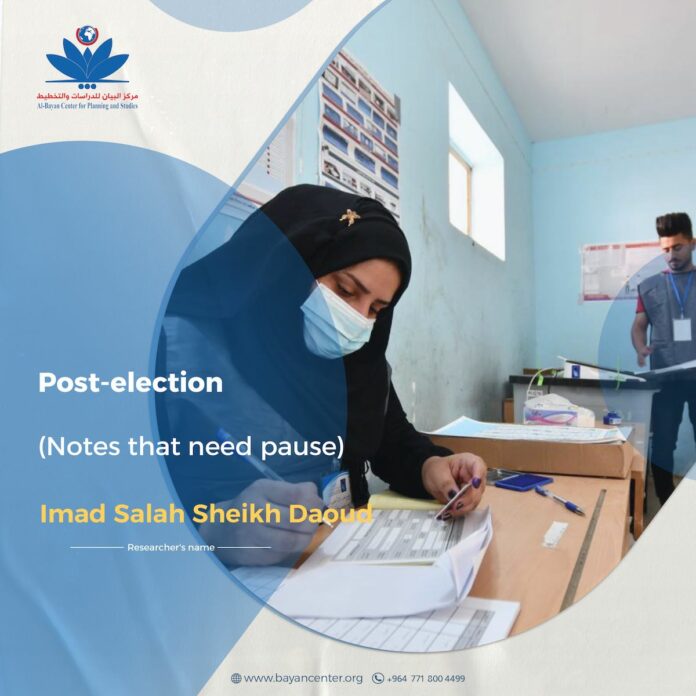Imad Salah Sheikh Daoud– Professor of Public Policy and Sustainable Development, Faculty of Political Science, Al-Nahrien University
A prelude:
Free and fair elections are a manifestation of the success of the democratic transition and the consolidation of its working mechanisms in political systems that seek successful and effective governance. This calls for the protection of the most important element of political freedom and the expression of opinion from all forms of polling, both at the organizational level and at the promotion level during the campaign period. This prevents the participation of voters, especially young people, and the strong observation of elections.
1. The need for youth participation: youth is the backbone of the democratic process in all its joints, as they have the capacity to participate, campaign, and monitor public problems. Any democracy in the world that is absent from the younger generation is a limp transition mechanism, which many nations of the world and the institutions involved in organizing elections do not pay attention to. Public participation rates in general elections are only declared at the end of the day. And neglects to publicize youth participation rates, reflecting the weak paths of interest in the political upbringing of adolescents and young people, particularly within the educational curriculum which, even if it exists, is nothing more than to overturn an imposition without reverence, It ultimately leads to the death of political culture, the most important tool for teaching young people the value of active participation in democracy, as well as the absence of what is known as a term. With “liquid democracy” it lends itself to include the political agenda of certain topics, via what is promoted on digital platforms, as is the case in the Taiwanese experience. “When one of the proposals put forward through those platforms is supported by at least 5,000 people, it is accordingly placed on the political agenda, where it is applied jointly with all participants, including those who sent the proposal themselves. Even if they have not yet reached the age of majority”
2. Voter Participation Account: This calculation is critical to gauge the credibility and effectiveness of elections. It also indicates the level of engagement between individuals, therefore, all data collected must be accurately recorded without deletion or manipulation and the institutions responsible for organizing elections have to seriously monitor voter participation because they play an essential role in decision-making through the representative agency that they have given to their representatives, If participation rates are low, these institutions must seek to rectify the situation by addressing problems related to the electoral process, when several factors play their roles. (Age, education, race, occupation, socio-economic status, candidates and issues to be voted on).
Free and fair elections are a manifestation of the success of the democratic transition and the consolidation of its working mechanisms in political systems that seek successful and effective governance. This calls for the protection of the most important element of political freedom and the expression of opinion from all forms of polling, both at the organizational level and at the promotion level during the campaign period. This prevents the participation of voters, especially young people, and the strong observation of elections.
1. The need for youth participation: youth is the backbone of the democratic process in all its joints, as they have the capacity to participate, campaign, and monitor public problems. Any democracy in the world that is absent from the younger generation is a limp transition mechanism, which many nations of the world and the institutions involved in organizing elections do not pay attention to. Public participation rates in general elections are only declared at the end of the day. And neglects to publicize youth participation rates, reflecting the weak paths of interest in the political upbringing of adolescents and young people, particularly within the educational curriculum which, even if it exists, is nothing more than to overturn an imposition without reverence, It ultimately leads to the death of political culture, the most important tool for teaching young people the value of active participation in democracy, as well as the absence of what is known as a term. With “liquid democracy” it lends itself to include the political agenda of certain topics, via what is promoted on digital platforms, as is the case in the Taiwanese experience. “When one of the proposals put forward through those platforms is supported by at least 5,000 people, it is accordingly placed on the political agenda, where it is applied jointly with all participants, including those who sent the proposal themselves. Even if they have not yet reached the age of majority”
2. Voter Participation Account: This calculation is critical to gauge the credibility and effectiveness of elections. It also indicates the level of engagement between individuals, therefore, all data collected must be accurately recorded without deletion or manipulation and the institutions responsible for organizing elections have to seriously monitor voter participation because they play an essential role in decision-making through the representative agency that they have given to their representatives, If participation rates are low, these institutions must seek to rectify the situation by addressing problems related to the electoral process, when several factors play their roles. (Age, education, race, occupation, socio-economic status, candidates and issues to be voted on).











